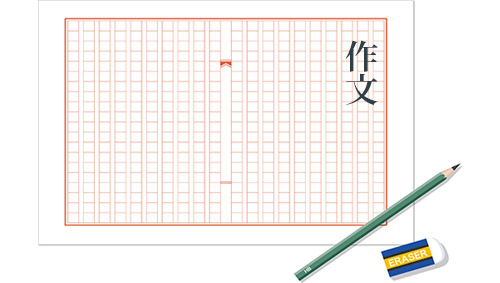Writing an essay about a memory in Japanese
Hi everyone! In this post, Learn Japanese Daily will introduce to you the lesson: Writing an essay about a memory in Japanese. Let’s start!

Contents
Writing an essay about a memory in Japanese
The paragraph below has about 700 words. It won a prize in the writing exam in Japan.
Opening
「人に迷惑をかけたくないの」祖母の口から出たその言葉にショックを受けたことを、今でも覚えている。
“Hito ni meiwaku wo kaketakunai no” sobo no kuchi kara deta sono kotoba ni shokku wo uketa koto wo, ima demo oboete iru.
I still remember how surprised I was at the words from my grandmother’s mouth, “I don’t want to bother everyone”.
Body
その言葉を祖母が口にしたのは、私が小学校に入学する少し前のことだ。
Sono kotoba wo sobo ga kuchi ni shita no wa, watashi ga shougakkou ni nyuugaku suru sukoshi mae no koto da.
My grandmother said those words when I was about to enter elementary school.
その年、祖母は階段で転んだことが原因で足に怪我を負い、さらに後遺症が残り、現在まで杖を使っている。
Sono toshi, sobo wa kaidan de koronda koto ga genin de ashi ni kega wo oi, sarani kouishou ga nokori, genzaimade tsue wo tsukatte iru.
That year, my grandmother got injured on her legs because of falling on the stairs. The after-effect have remained and she still has to use a cane till now.
ある日、出掛け先で歩いていた祖母は「ちんたら歩くなよ」と見知らぬ若者に言われた。
Aru hi, dekake-saki de aruite ita sobo wa “chintara aruku na yo” to mishiranu wakamono ni iwa reta.
One day, when walking on the road, my grandmother was told by a strange young man “Don’t walk so slow”.
そのことがきっかけとなり、日に日に塞ぎこむようになってしまった。
Sono koto ga kikkake to nari, hinihini fusagi komu you ni natte shimatta.
Those words made her be in low spirits day by day.
怪我をするまでは散歩が趣味だった祖母。
Kega wo suru made wa sanpo ga shumidatta sobo.
Walking had been my grandmother’s hobby until her legs got injured.
しかし、私の知る祖母の姿はそこにはなかった。
Shikashi, watashi no shiru sobo no sugata wa soko ni wa nakatta.
But since then, the grandmother that I have always known is not there anymore.
そんな祖母に耐えられなくなった私が「前みたいに一緒に散歩しようよ」と誘った時に言われたのが、あの言葉だった。
Sonna sobo ni taerarenaku natta watashi ga “mae mitai ni issho ni sanpo shiyou yo” to sasotta toki ni iwareta no ga, ano kotoba datta.
I couldn’t bear to see my grandmother like that, so I invited her “Let’s take a walk together like before”. And what I got was these words from her.
「迷惑なんて思ってないよ」今だったら言えるだろう言葉を、当時の私は言えなかった。
“Meiwaku nante omottenai yo” imadattara ierudarou kotoba wo, tooji no watashi wa ienakatta.
I could say “I don’t mind at all” to her now. But at that time, I couldn’t say a word.
その時は、祖母が自分のことをそんな風に感じていたことに、ただただ悲しくなり、大泣きをした。
Sonotoki wa, sobo ga jibun no koto wo sonna fuuni kanjite ita koto ni, tadatada kanashiku nari, dai naki wo shita.
At that time, I became sad for my grandmother’s way of thinking about herself and cried.
泣き止まない私に、祖母は「ごめんね、ごめんね」と呟き、優しく背中をさすってくれた。
Naki yamanai watashi ni, sobo wa “gomen ne, gomen ne” to tsubuyaki, yasashiku senaka wo sasu tte kureta.
My grandmother gently touched my back and said to me who couldn’t stop crying “I’m sorry, I’m sorry”.
最近、この話に続きがあることを祖母から聞いた。
Saikin, kono hanashi ni tsudzuki ga aru koto wo sobo kara kiita.
I recently heard from my grandmother what happened after that.
「泣きながらね、あなたが言ったのよ。『もっと迷惑かけて、もっと迷惑かけて』って。それが何だか面白くて、笑っちゃったのよね」
“Nakinagara ne, anata ga itta no yo. “Motto meiwaku kakete, motto meiwaku kakete” tte. Sore ga nandaka omoshirokute, waratchatta no yo ne”
“While crying, you said “Be more annoying, be more annoying”. That was interesting so I laughed”.
自分では覚えてなかったが、その時の気持ちが分かる気がする。
Jibunde wa oboe tenakattaga, sonotoki no kimochi ga wakaru ki ga suru.
I didn’t remember it, but I felt like I understood my own feelings at that time.
自分のことを迷惑と思ってほしくない気持ちと、辛い時に頼ってほしかった気持ちが混ざって出た言葉だったのだろう。
Jibun no koto wo meiwaku to omotte hoshikunai kimochi to, tsurai toki ni tayotte hoshikatta kimochi ga mazatte deta kotoba datta nodarou.
Perhaps those words came from the feeling of wanting her to rely on me when things were difficult, and the feeling of not wanting her to think she was annoying.
Ending
先日、祖母と浅草へ出かけた。
Senjitsu, sobo to Asakusa e dekaketa.
I went to Asakusa with my grandmother the other day.
駅には急な階段しかなく、祖母が登るためには背中を押しながら登るしか方法がなかった。
Eki ni wa kyuuna kaidan shika naku, sobo ga noboru tame ni wa senaka wo oshinagara noboru shika houhou ga nakatta.
At the station, there is only one staircase. The only way for my grandmother to climb was to to climb while being pushed from behind.
「ご迷惑おかけします」私にそう言う祖母の顔は、あの時と違い、晴ればれとしていた。
“Gomeiwaku okake shimasu” watashi ni sou iu sobo no kao wa, ano toki to chigai, hare bare to shite ita.
“I’m sorry for the inconvenience”. When saying that to me, my grandmother’s face was different from that time, it was a cheerful face.
Note when writing a paragraph about a memory

You can refer to the following outline:
Opening:
Introduce a memory that you can’t forget. You can use the following sentences : 今でも覚えている (I still remember); 10年以上も前のことだが今でも覚えている (Although it happened more than 10 years ago, I still remember it); etc.
Body:
Write about what happened at that time. You can use the following phrases : ある日, その時, その年, etc. Express your feelings about the events that make you impressed.
Ending:
There are many ways to write the ending. For example, you can write about the changes in the present after that event. And you can also express your feelings about that event (memory).
Above is: Writing an essay about a memory in Japanese. Hope this post can help you improve your writing skills. Wish you all good study!


